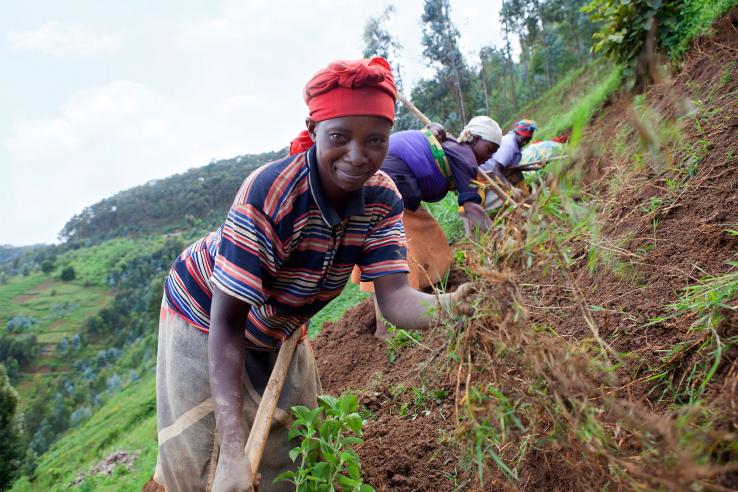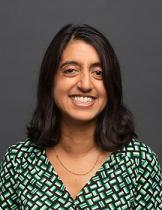J-PAL's new Gender sector

“Do you agree with the statement, “Men are better suited than women to work outside the home”?”
Seema asked parents in India this question as part of a research study to understand how a school-based program designed to change attitudes about gender roles could help reduce gender bias in Haryana, India.
According to recent World Bank estimates, only 27 percent of women in India currently participate in the labor force—a steep ten percentage point decrease from 2005 rates. This large decrease is notable because, according to analysis by J-PAL affiliate Rohini Pande (Harvard) and Charity Troyer Moore, about one-third of women who work primarily in housework would like to have a job but seem to be prevented by traditional gender norms that restrict women’s mobility.
Bringing rigorous evidence to bear in understanding how gender norms affect everyone, in India and around the world, can help inform and improve policy to reduce poverty and gender inequality.
At J-PAL, the launch of a new Gender sector represents our commitment to further expand the base of policy-relevant evidence.
The Gender sector, chaired by Seema, will address a range of issues important to citizens, policymakers, and practitioners around the world: How can we most effectively address gender disparities and inequality at scale? Are existing development programs closing the gender gap in human development? How do gender dynamics in families and society affect the impact of these programs? And how can we best measure changes in areas like agency and empowerment?
In addition to Seema's own research, J-PAL affiliated professors have investigated these and other related questions for many years, conducting more than 130 evaluations that focus on the impacts of programs and policies on women and girls or men and boys. Some examples include:
Lori Beaman (Northwestern University) and co-author Andrew Dillon researched the consequences of targeting agricultural technology information to different parts of social networks among farmers in Mali. They found that, since different types of people are located in different parts of the network, the choice of targeting strategy may leave out the periphery, including women.
Esther Duflo (MIT), Pascaline Dupas (Stanford) and Michael Kremer (Harvard) researched the impact of full, need-based scholarships on secondary school enrollment and the returns to secondary education in Ghana over more than ten years. Women who won full secondary school scholarships married later and delayed childbirth, particularly unwanted pregnancies, relative to women who did not win scholarships.
Rohini Pande (Harvard), Erica Field (Duke), and Simone Schaner (Dartmouth) along with co-authors Natalia Rigol and Charity Troyer Moore, are researching the impact of offering women individual bank accounts on women’s financial control. Linking earnings from a government workfare program (that offered welfare payments in exchange for work) to women’s bank accounts led to increased employment. Women who had previously been the least involved in the labor market and whose husbands expressed the most opposition to women working experienced the largest impacts, suggesting that more control over earnings increased women's influence and agency.
With a new academic chair (Seema) and dedicated policy staff (Lucia), J-PAL’s initial sector efforts will focus on:
1. Identifying open research questions and working with funders, implementing organizations, and J-PAL affiliates to determine opportunities for new randomized evaluations with the potential to generate policy-relevant evidence that promotes gender equality.
While J-PAL’s current grantmaking initiatives already address many questions related to gender, we are exploring opportunities to develop a new grantmaking initiative that will generate new research in the sector, contribute to learning, and provide opportunities for partners and donors to collaborate on testing innovative new approaches.
2. Creating practical tools for policymakers, practitioners, and researchers to better incorporate analysis of gender dynamics and impacts into existing randomized evaluations.
To do this well, researchers need better tools for measuring concepts that are hard to quantify, like empowerment. Stay tuned for a forthcoming practical guide on measuring women’s empowerment in M&E and impact evaluation, co-authored by Rachel Glennerster, Claire Walsh, and Lucia.
3. Continuing J-PAL’s work in gender analysis and sharing these results as public resources on the J-PAL website.
We will focus on understanding the impact of policies and programs in all regions of the world that: 1) specifically seek to empower women and girls; 2) don’t necessarily have gender-specific goals but have different results by gender when impacts are disaggregated; and 3) have program impacts that are mediated by gender dynamics in society.
In the study of the attitude-change program in India, for example, Seema and co-authors found that the changes in attitudes were similar for boys and girls. Yet, behavior changes were larger among boys, perhaps because girls faced more barriers to acting on their changed attitudes. This highlights how, even when programs achieve promising results, social contexts might continue to constrain women and girls’ options and choices differently than those of men and boys.
4. Producing topic-specific and cross-cutting policy lessons.
We already have policy lessons on topics like how to increase girls’ school enrollment and the impact of gender quotas on community decision-making. Moving forward, we will continue producing new policy lessons focused on gender equality. Broadly, this gender analysis can also help us understand the mechanisms behind how and why programs work—and for whom. This work, we hope, will inform future policies and programs. As in other J-PAL sectors, we will build partnerships with governments and implementing organizations to put this evidence into practice.
Since women and girls make up half of the world’s population and face different preferences, constraints, and trade-offs compared to men and boys, J-PAL affiliated professors are continuing to prioritize understanding how development policies interact with gender. With the launch of the Gender sector, we will further this cross-cutting research and work to ensure that policies and programs are informed by evidence.
What are open questions related to gender you’d like to see addressed in randomized evaluations? Let us know on Twitter (@JPAL_Global, @seema_econ) or via email at ldiazmartin[at]povertyactionlab[dot]org.

